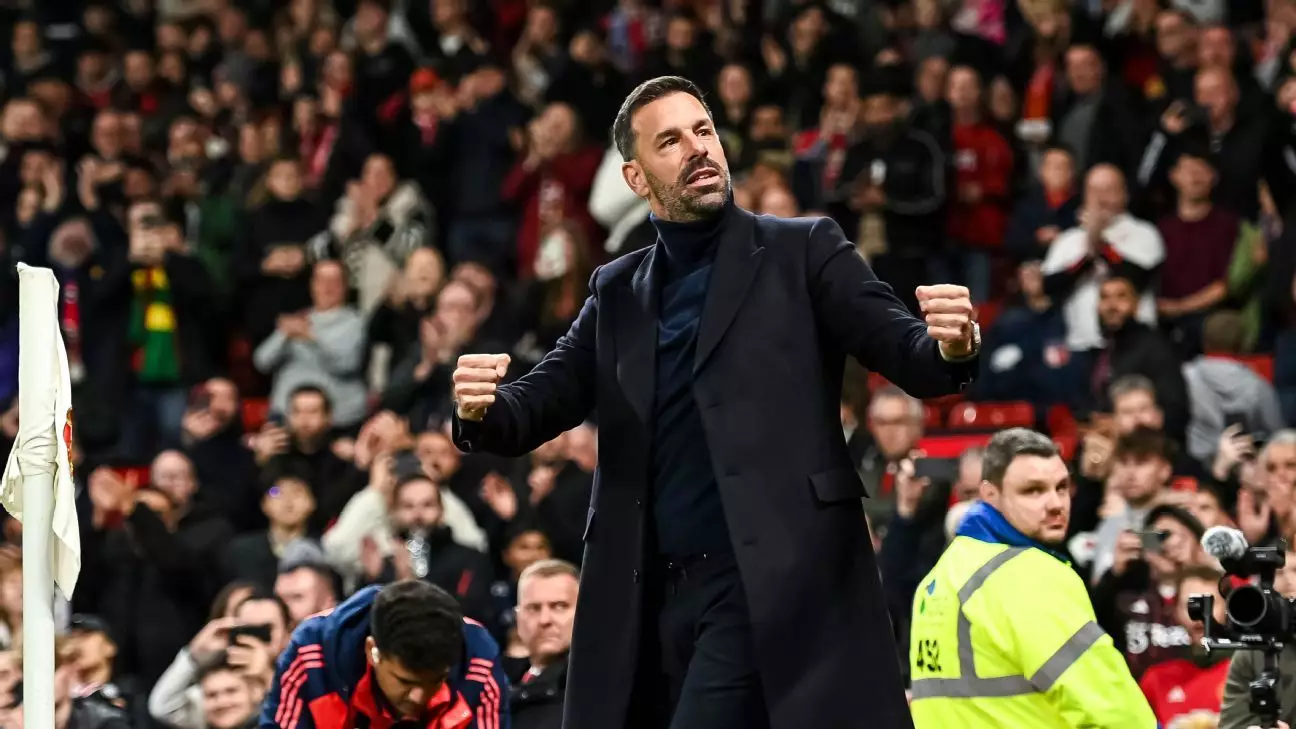The departure of Ruud van Nistelrooy from Manchester United signifies a pivotal moment in the club’s ongoing efforts to reclaim its status as a footballing titan. Van Nistelrooy, a name synonymous with scoring prowess during his player days, held the interim head coach position following Erik ten Hag’s dismissal. In his four games at the helm, he successfully led the team to three victories and a draw, netting a remarkable 11 goals in the process. The club has expressed gratitude for his dedication and performance during this transitional phase, acknowledging him as a legendary figure who will always be cherished at Old Trafford.
However, this brief period was characterized by instability and the looming expectation for a permanent managerial solution. Van Nistelrooy’s departure, alongside members of Ten Hag’s coaching staff like Rene Hake and Jelle ten Rouwelaar, signals a shift towards a new era under Rúben Amorim, marking a need for doctrinal changes that go beyond immediate results on the pitch.
Rúben Amorim, recently appointed as the permanent head coach, is set to introduce a tactical overhaul at Manchester United, which is keenly anticipated by players and fans alike. Amorim’s preferred 3-4-3 formation represents a significant departure from the traditional setups that have marked United’s recent tactical approach. The last time the club frequently utilized a three-man defense was under Louis van Gaal in 2014, a system that met mixed results.
Central defender Matthijs de Ligt has voiced a critical point: the major challenge for Amorim will not only be selecting the right formation but also aligning players so that everyone operates cohesively. Effective communication and understanding among the players are essential to this strategy’s success. “It’s not just about the shape or the individual roles,” De Ligt emphasized. “It’s about how well the team functions as a unit.” For Amorim, creating synergy while instilling his philosophy will determine whether his tactical vision translates successfully onto the pitch.
The timing of Amorim’s arrival coincides with the international break, meaning most players are currently unavailable as they represent their national teams. This presents a unique challenge as Amorim will need to build relationships and establish a rapport with the squad upon their return. Thus far, discussions with key players, like Casemiro, have been limited but promising, with the Brazilian acknowledging Amorim’s impressive track record at Sporting CP.
“He’s brought about significant change and success at Sporting,” Casemiro remarked. “We know of his capabilities, and there’s a shared enthusiasm about his return to United.” The Brazilian’s endorsement could foster a spirit of optimism among players as they adapt to new tactics and expectations. However, the real test will come when the players regroup and begin to transition into Amorim’s system during practical training sessions.
With a solid foundation now laid, the path forward for Manchester United appears both exciting and uncertain. Amorim brings a wealth of ambition and a proven track record in domestic success, suggesting that fans and players could be on the brink of a transformative period. The challenge will be to strike a balance between tactical innovation and the identity and traditions that have long defined Manchester United.
As the team gears up for their next encounter against Ipswich Town on November 24, the focus will not only be on achieving results but also on strengthening the team’s unity and understanding, as emphasized by both De Ligt and Casemiro. The transition marks a new chapter at Old Trafford, one that requires patience from fans but carries an underlying promise of regaining glories past.
The combination of Amorim’s leadership, coupled with the talents of the team, could signal a renaissance for Manchester United if approached with the right mindset and a commitment to collective growth and adaptation. As they embark on this venture, the hope is that the club can once again lift itself to the heights that its storied history demands.
